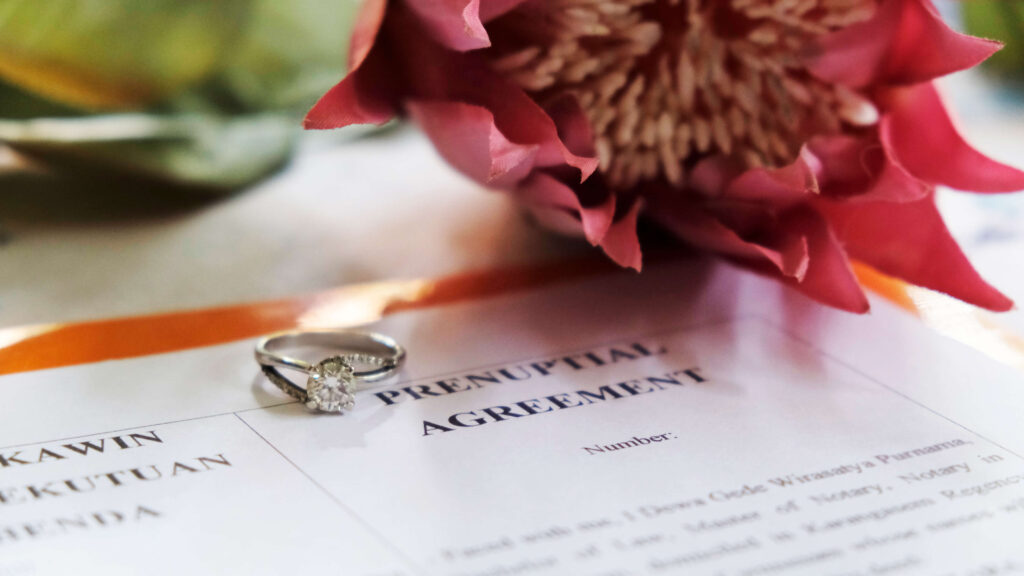Prenuptial Agreement in Indonesia

A prenuptial agreement, commonly known as a “prenup,” is basically an agreement agreed upon by a husband and wife that regulates the mixing or separation of assets before marriage or during the marriage. Prenuptial agreements are optional, are not mandatory in nature, and may be carried out as long as they do not violate the principles of law, religion, or decency. The basis of the prenuptial agreement is regulated in Article 29 paragraph (1) of Law Number 1 of 1974 concerning Marriage (hereinafter referred to as the Marriage Law) in which the meaning of the article has changed after the Constitutional Court Decision Number 69/PUU-XIII/2015, one of which states that apart from being able to take place before the marriage, the prenuptial agreement can also be made while the marriage is taking place so that the provision in Article 29 paragraph (1) reads: before the marriage takes place or while in the marriage bond, both parties with the mutual agreement can submit a written agreement which is legalized by the employee. Following the marriage registrar, the contents apply to the third party involved.
A prenuptial agreement is basically an agreement that is used to exclude one of the consequences of marriage as stated in Article 35 of the Marriage Law, which relates to the provisions of joint assets and innate assets. In the marriage agreement, the husband or wife can agree not to mix assets, and can also agree, for example, that each other’s innate assets in the form of gifts become joint property. One of the reasons for this exception is to avoid conflict in the future, for example when a husband or wife is separated. As a result, one of the goals of having a prenuptial agreement is to provide legal protection from lawsuits that may arise when a husband and wife divorce or when a marriage is broken because one of the partners dies. But apart from that, the other purposes of a prenuptial agreement are as follows:
1. Debt owned by husband or wife will be the responsibility of each
For example, in this case, if one of the spouses is in debt or say in a state of bankruptcy or insolvency, then the assets that can be used to make payments are the assets of each in their personal name. Of course, if the assets used to pay off the debt are assets of one spouse, then the assets of the other spouse can still be used to help meet household needs.
2. Ensure the continuation of family heirlooms
In the absence of a merger of assets, the position of the inheritance from each party can still be maintained.
3. Protecting the interests of the wife if the husband practices polygamy
As the provisions of Article 3 paragraph (2) and Article 4 of the Marriage Law allow a husband to have more than one wife or polygamy, the existence of a prenuptial agreement that regulates the separation of assets from assets that should be a joint property will certainly be able to protect the interests of the wife.
Prenuptial agreements that are commonly agreed upon are related to the separation or combination of inherited assets in the marriage, for example, assets from each other’s businesses, inheritance, and grants. The couple, either husband or wife, can then arrange for debts to be carried by the couple in their prenuptial agreement, stating that the debt of one of the parties will later be jointly or solely borne. In addition, the provisions regarding the wife to take care of her personal property, both movable and immovable, and enjoy the results of good income from her property and work or other sources. Then it can also be stated that the wife can manage her wealth without requiring the power of the husband.
For couples who want to make a prenuptial agreement, there are several things that must be prepared, namely:
- Identity Card of prospective husband/wife for those who are going to get married, and Identity Card of husband/wife for those who are already in a marriage bond;
- Family Card of prospective husband/wife for those who are going to get married, and Family Card of husband and wife for those who are already in a marriage bond;
- Photocopy of the Marriage Agreement deed made by a Notary and has been legalized to show its authenticity;
- Quote of marriage certificate;
- If the applicant is a foreigner then attach a Passport/Kitas (for foreigners)
After all the requirements are met by the couple, the deed can be registered at the local sub-district Office of Religious Affairs (KUA) for those whose marriages are held using Islamic religious law and at the local Population and Civil Registry Service for those whose marriages are held under other religious laws.
The registration is intended to fulfill the publicity element of the agreement, namely, that third parties, namely people outside the husband or wife, know and comply with the provisions contained in the agreement. If it is not registered, then the prenuptial agreement will only bind the parties contained in the and not bind third parties.
If you need further consultation regarding the prenuptial agreement, please contact us via:
Hotline: 0811109245 / 081932741333
Email: info@kandaralaw.com

